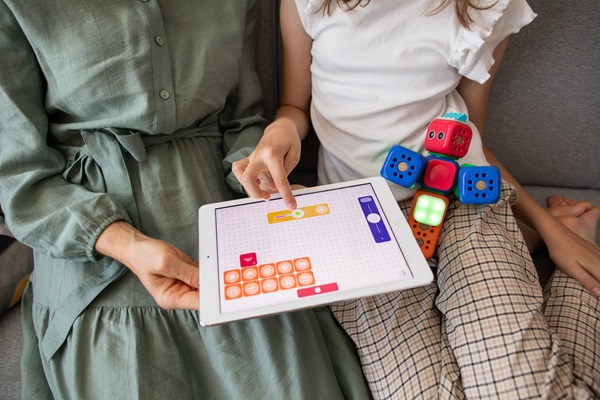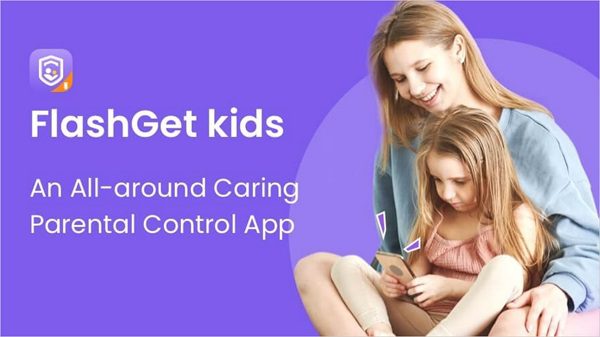Technology has undoubtedly made our lives easier by facilitating online communications, data management, and many other ways, but it has also created some complexities. According to research, 32% of children are addicted to screen usage, and about 66% say they feel stressed without them. In this blog, we are going to explore the positive and negative effects of technology on children, its long-term impacts, parental guide tips, and more. So, keep learning!
What are the positive effects of technology on children?
Technology undoubtedly contributes positively to the development of children in several meaningful ways. In the 21st century, technology has penetrated every aspect of our lives, with the field of children’s education being the primary one that has been greatly affected.
Educational and learning needs
In early childhood education, technology has made it possible for kids to access a wide range of resources. For example, interactive education apps and virtual classes allow children to be involved in learning even if they are miles away from the school. Educational games and simulations offer interesting perspectives on complex subjects.
Cognitive development
It is facilitated through challenges provided by technology, such as puzzles, which enable them to sharpen their problem-solving skills and logical reasoning and encourage analytical thinking. Moreover, diverse online content stimulates creativity among young people, leading them to innovative thinking and new ideas.
Social connectivity
On social connectivity grounds, technology helps children keep up with friends through various online platforms where they can meet anytime they want. For example, apps like Facebook, WhatsApp, WeChat, Instagram, etc., can help connect friends who are continents away. In the past, this task was impossible using non-tech methods like letters.
Entertainment and leisure
Technology provides entertainment that allows people to relax after a hectic day. Some video games improve hand-eye coordination, making them helpful for physical and mental growth. Moreover, advanced tools like audiobooks or e-books bring worldwide literature and arts closer. It has made literacy something permanent rather than a temporary phenomenon.
Digital literacy for children
Digital literacy is very important for children growing up in a world where technology drives everything. Early contact with digital tools will be useful for them in their future studying and working lives. Children who have mastered online safety know how to safeguard their privacy, thus ensuring responsible Internet use. Additionally, the ability to use productivity software and research tools helps people to be successful during this era.
What are the negative effects of technology on child development?
There are positives and negatives to almost everything, and so are the effects of technology on children. If technologies are life changers, then on the flip side, excessive use can negatively affect children’s growth. So, let’s discuss the most highlighting drawbacks of technology.
Physical health concerns
Excessive screen time leads to a sedentary lifestyle and raises physical health concerns. For example, prolonged usage of computers/smartphones may strain your eyes or myopia. Alternatively, watching the electronic screen before sleep may disrupt rest periods and cause sleep disorders. Mayo Clinic recommends limiting screen time to a half hour to an hour a day for children between 2-5 years old.
Mental health impact
Everyone knows that mental health is also affected by too much exposure, particularly through screens. Children are fond of using social media, which at times can make them feel anxious, depressed, or even lower their self-esteem. Technology addiction affects several children who can’t separate themselves from these devices, thereby affecting them emotionally.
Social skills and relationships
However, excessive use of technology among children has been shown to affect social skills and relationships. You know, managing screen time and children is really challenging for parents. It limits face-to-face interactions, consequently leading to the declination of vital social skills. Communication and empathy are difficult for most children struggling with a digital life. As they are unfamiliar with the real meaning of life.
Cognitive and academic challenges
Overusing technology also causes cognitive and academic difficulties. Technology affects children’s attention, making it difficult for them to concentrate on tasks. Frequent app and activity switching can impair the ability to focus and process information deeply. Screen time is also a factor in children’s academic performance, as excessive use implicates poorer academic outcomes. Parents should know that technology can distract them from homework, reading, and other educational activities.
Knowing the long-term impact of technology
When discussing the long-term effects of technology on children, we should also keep in mind that it is likewise a double-edged sword. All in all, developing digital literacy properly can be very beneficial for the future. Well, let’s get started!
On the brighter side, it has introduced young people to modern gadgets that will set a direction for future standards within society. Exposure to such devices will make young children more open to adapting to the rapidly changing digital world.
Additionally, technology affects career development and skill acquisition significantly. The use of technologies enhances problem-solving abilities coupled with critical thinking. Digital literacy skills also prepare them for jobs in tech-driven industries where digital professionals are highly demanded.
However, remember that the over-dependence on technology in early childhood may restrict critical life skills. Young kids who spend too much time with screens can lack the ability to communicate and empathize with other people. Another consequence is diminished physicality as children abandon outdoor activities and physical play in general. Overusing digital devices also makes it harder for them to focus on tasks requiring deep concentration.
The shaping of future societal norms may have both negative and positive implications. You may have noticed that inequalities increase as children without access to technology lag behind others who have access.
Have you ever noticed that rapid technological changes present challenges when it comes to career development? What one learned earlier could become outdated quickly, requiring continued learning and adjustment. This constant requirement for skill updates may lead to stress and anxiety, especially if a child is not taught how change should be managed.
How does technology affect parenting?
Despite its challenges to privacy and safety, technology and parenting have strong bonds. Technology enhances communication, provides resources, and eases childcare pressures and tasks, among other things.
On one hand, some parents cannot keep up with the rapidly changing dynamics of digital devices, thus being the challenge of modern parenting. The speed at which digital tech changes has left parents overwhelmed and unaware of what is happening around them, making it hard for them to be proactive and engaged.
On the other hand, advanced technology has made childcare more convenient and efficient. It is one of the biggest effects of technology on parenting children. For instance, smart home devices, such as baby monitors or automated reminders, and various parenting apps provide features such as tracking a child’s growth, scheduling management, and health monitoring.
Moreover, online communities offer advice, tips, and support for better childcare decisions. Therefore, these sources help parents reduce stress by becoming more self-assured about parenting.
Another advantage is the role technology plays in facilitating learning within households. Parents can improve their children’s learning path by using educational applications and games at anywhere. It allows personalized learning and development depending on the individual needs and interests of each child.
It is astonishing how much technology influences family dynamics, helping parents keep in touch with their kids. Parents can reach out to their children through monitoring and communication apps even when they are physically apart. This helps parents to know that their children are still safe, hence ensuring a sense of comfort and encouragement.
What can parents do to balance kids’ technology usage?
Balancing kids’ technology usage is critical for the proper development and use of digital tools. So, in this part of the blog, we will discuss some practical strategies that parents can adopt to keep their kids in line.



- Create clear screen time rules for children
First, set daily limits according to AACAP screen time guidelines for kids. Make sure those devices shut down regularly so that your child gets up, moves around, or simply stays away from the screen. These regulations teach kids about the importance of not going overboard with gadgets.
- Encourage offline activities and hobbies
Promote reading books during free time. Encourage them to participate in sports activities or arts that promote creativity through drawing, painting, etc. This will help young people develop all-round personalities who might only focus on one thing, such as video games!
- Teach Internet safety for children
Your child should learn about such dangers as cyberbullying on the Internet and how to keep personal data safe even while online. You should have open communication so that if any of your children have any experiences to share with you, they feel free to do so.
- Be a role model
Show your attentiveness when it comes to managing the time by your own example. When children see their parents balancing technology use with other activities, they will do so themselves. Do something together that does not require a screen during family times.
- Create tech-free zones and times
For instance, banning technology in bedrooms or at meals can be a good starting point for establishing technology-banned areas. There should also be tech-free moments, which can encourage face-to-face interactions within the home unit.
- Use parental control app for monitoring
Now, you must be thinking about how you allow mobiles to children and limit their use at the same time. Fortunately, there are parental control apps for kids (like the FlashGet Kids app) that provide valuable resources to manage children’s engagements with devices.



FlashGet Kids is a trustworthy parental control tool that helps you regulate your kids’ on-screen activities and screen time properly. Some key functions offered by FlashGet Kids include:
- Screen limit: This feature allows you to limit your kids’ screen time. Set a specific time, and the device will turn off automatically after crossing the time limit, or you will be informed about that.
- Keyword detector: If you feel that your kid is stumbling across explicit content or making false connections, you can filter the content on your kid’s device and get an alert when your kid tries to access that content.
- App blocker: Due to modern technologies, unlimited apps are available in the digital market. If you feel any app is risky or hazardous for your kid, FlashGet Kids enables you to block that app in your kid’s device.
The FlashGet Kids app’s features are not limited here. It offers many more that help ensure internet safety for children, like screen monitoring, activity reports, location trackers, etc.
Conclusion
After going through the above discussion, it’s difficult to make a hard statement about whether technology has only positive or negative effects on children. If we make use of technology by considering preventive measures like limited use, positive use, etc, then it is quite beneficial. But, if we take it to our nerves and continue delving into it all the time, then obviously, it’s harmful. Moreover, make sure to use parental control tools like the FlashGet Kids app to ensure your kids’ safety.

